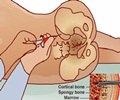
"No one had ever looked at these data in children," said Leslie E. Lehmann, MD, clinical director of pediatric stem cell transplantation at Dana-Farber/Children's Hospital Cancer Center (DF/CHCC). "This is very important information and will allow us to counsel families appropriately, as well as try to devise interventions that reduce the rate of readmissions."
The study by Lehmann and Harvard Medical School student David Shulman is being presented at the 26th annual meeting of the American Society of Pediatric Hematology Oncology in Miami, April 24-27.
A record review of 129 children from 2008 to 2011 revealed that 64 percent had at least one hospital readmission within 180 days of transplant. The source of the donor cells was a key predictor: 79 percent of patients receiving transplants from a related or unrelated donor were readmitted compared to 38 percent who received their own cells (autologous transplant). The mean number of readmissions was 2.4, indicating that for some children, discharge after transplant is just the beginning of a long process characterized by repeated hospital stays. Fever without a documented source of infection accounted for 39 percent of the readmissions; 24 percent were for infections and 15 percent for gastrointestinal problems.
"Most of the patients went on to be successfully treated and ultimately did very well," commented Lehmann.
"We hope these findings can eventually lead to identifying a group of low-risk children who could be managed at local hospitals rather than transplant centers, reducing costs and inconvenience to families."
Advertisement
Advertisement










